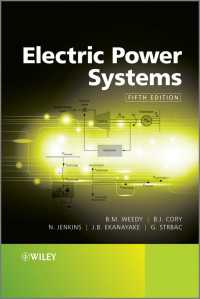Full Description
This textbook gives readers an accessible overview of 20 of the most influential thinkers on education, including long-established names (Vygotsky, Piaget, Bruner), more recent theorists (Dweck, Goleman, Rosenshine) and other key individuals whose writing has helped shaped our views on teaching and learning.
Each chapter includes practical examples showing how theories can be used to inform classroom teaching, and critiques of each theorist exploring opposing viewpoints and the strengths and weaknesses of different ideas.
This fourth edition includes:
A new chapter on John Sweller and cognitive load theory
A new 'next steps' feature in every chapter, offering research project suggestions for students, and suggestions for essay questions and discussion topics for tutors.
This is essential reading for any university course that covers learning theory, with particular relevance for initial teacher education, education studies and early childhood degrees.
Contents
Introduction
Chapter 1: John Dewey: A democratic notion of learning
Chapter 2: Maria Montessori: Liberating the child
Chapter 3: Jean Piaget: Understanding the mind of the child
Chapter 4: Lev Vygotsky: An early social constructivist viewpoint
Chapter 5: B.F. Skinner: The father of operant conditioning
Chapter 6: Benjamin Bloom: Learning through taxonomies
Chapter 7: Malcolm S. Knowles: Contextualising adult learning
Chapter 8: Jerome Bruner: An evolution of learning theories
Chapter 9: Albert Bandura: Learning through observation
Chapter 10: Urie Bronfenbrenner: The ecology of human development
Chapter 11: Paulo Freire: Oppression, freedom and critical approaches to education
Chapter 12: Donald Schön: Reflection and learning
Chapter 13: David Kolb: Experiential Learning Theory
Chapter 14: Jean Lave and Etienne Wenger: Socially situated learning and communities of practice
Chapter 15: Barak Rosenshine: Principles of instruction
Chapter 16: Daniel Goleman: Emotional intelligence
Chapter 17: Guy Claxton: Learning power
Chapter 18: Dylan Wiliam: Assessment for learning
Chapter 19: Carol Dweck: Mindsets and motivation
Chapter 20: John Sweller: Cognitive Load Theory







